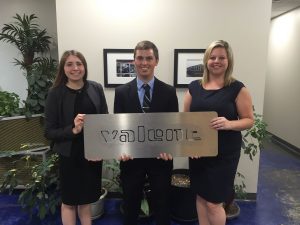College is all about learning, and there’s no better way to test that knowledge than through hands-on experience. Students across the College of Engineering know experiential learning, such as internships or co-ops, is a great way to apply their coursework and prepare them for their future careers.
One way students find out about such opportunities is through the college’s Engineering Career Services (ECS) team. ECS coordinates the Engineering Career Fair, which takes place twice a year, along with many other smaller-scale events throughout the year to offer students a chance to network with a wide range of companies and organizations that offer valuable experiences across the engineering field.

Two students completed internships this past summer, and they both say ECS helped them find an opportunity that was engaging and valuable.
Eric Lacey, senior in mechanical engineering, worked as the intern for the product development group for Valent Air Management Systems, and he held a a co-op for the same company during the previous spring semester and last summer. He found out about it during an ASHRAE (American Society of Heating, Refrigeration, and Air-Conditioning Engineers) club meeting that ECS helped coordinate.
Kelsey McConnell, junior in industrial and manufacturing engineering, worked as an industrial and manufacturing co-op for Unison Comfort Technologies (Valent) from January to July 2016. She found out about the company at the Engineering Career Fair and was able to have an on campus interview the next day.
Both say their experiences were challenging and rewarding, adding to the knowledge they’ve gained so far through their coursework. Here’s a bit more about what they learned.
Q: What major projects/assignments were you assigned?
EL: During my almost full year at Valent, I worked on multiple large projects that had a big impact on the company. One project consisted of testing the products for energy efficiency to validate their compliance with United States Department of Energy standards. This was a very meaningful project for the company as its results could drastically impact future sales and the future of the company. For a company to have the confidence in an intern to handle such a project is uncommon, and it’s a great opportunity for an aspiring engineer. Other projects have involved designing new parts and systems, handling service issues, and performing research and development for HVAC products.
KM: I had three primary projects. One was to observe and document the purchased parts flow and provide an improvement plan. To improve the process, I designed a cart that saves six square feet per cart, has safer ergonomics with easy crane access and is organized in such a way that you can tell that a part is missing when the cart is loaded. The company loved the design and is using it on the assembly line!
I also worked on increasing the first pass yield, which was defined as “the number of units that go through the End of Line Test that pass on the first try with no errors, mechanical or cosmetic.” I updated the company’s sign-off sheets and re-implemented the updated sign-off sheets with a defined process. After the updated sign-off sheets were implemented, there was a steady increase of about 12%, and the company is at the highest first past yield it has ever seen.
Throughout my internship, I completed numerous time studies and was able to determine a new method for building the large units, which resulted in a potential 60% production increase assuming accurate manpower, tools and sales.
Q: What was your top takeaway from the experience?
EL: Be confident in the skill set Iowa State has given you. You may walk into a situation that you’ve never experienced before, or you may be given a project where you have no clue where to start. Don’t think of it as a daunting task. Think of it as an opportunity. It’s an opportunity to learn something new and to expand your knowledge base. The key to this thinking is to have confidence in yourself that you will learn and understand in the way that Iowa State has taught you.
KM: There are so many things I learned from my internship it’s hard to pick just one thing, but I would have to say that making the production floor employees’ jobs easier and more efficient was the highlight of my experience. I have always been a people-person, and I get great satisfaction from helping others. Seeing the positive change in the employees and the atmosphere during those eight months definitely solidified that I am doing what I love in more ways than I could imagine.
Q: Why are internships important from a student perspective?
EL: Internships are perhaps the most important part of being a student. College can teach you how to study, how to think logically, how to manage your time and how to interact with others in a professional manner. However, the best way to develop these skills is to apply them in the real world, through experiences such as an internship or co-op. It is where you truly develop yourself as an engineer.
KM: As engineering students at Iowa State, we are taught how to think critically and are given tools to solve problems related to our specific field. At an internship, you actually apply your critical thinking skills and use the problem solving tools in a real-world setting. It’s one thing to simulate a process or design a process, but it’s an entirely different thing to actually live it. There is a deeper connection and understanding that comes with an internship that you can’t learn in the classroom.